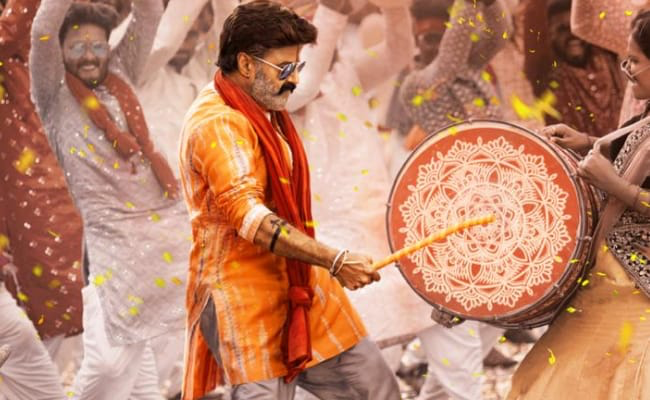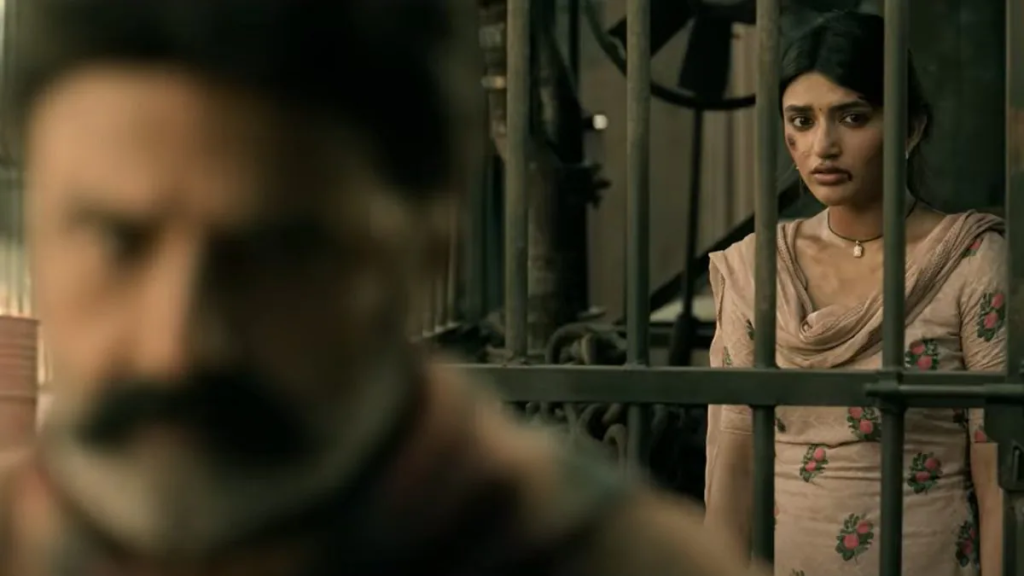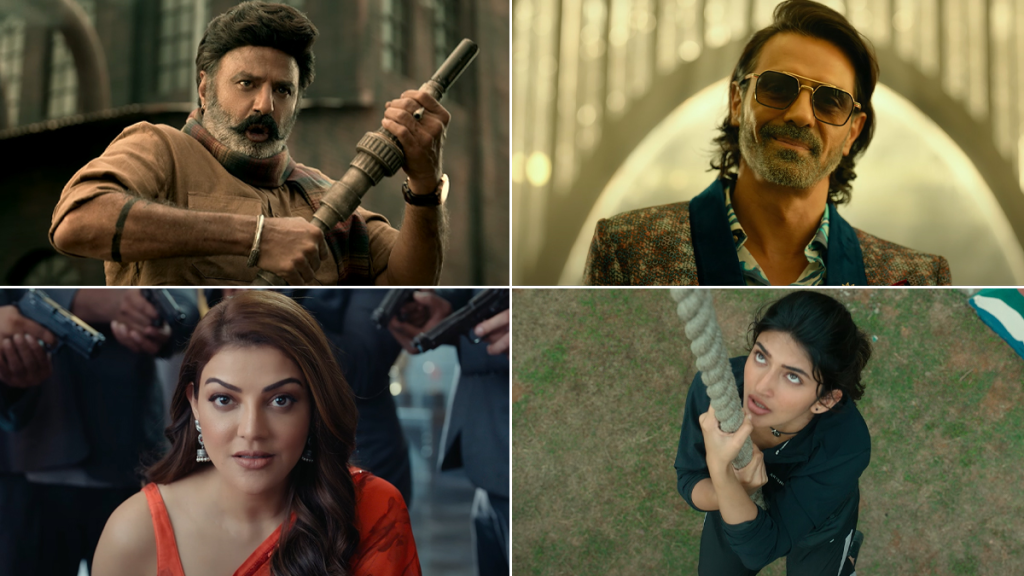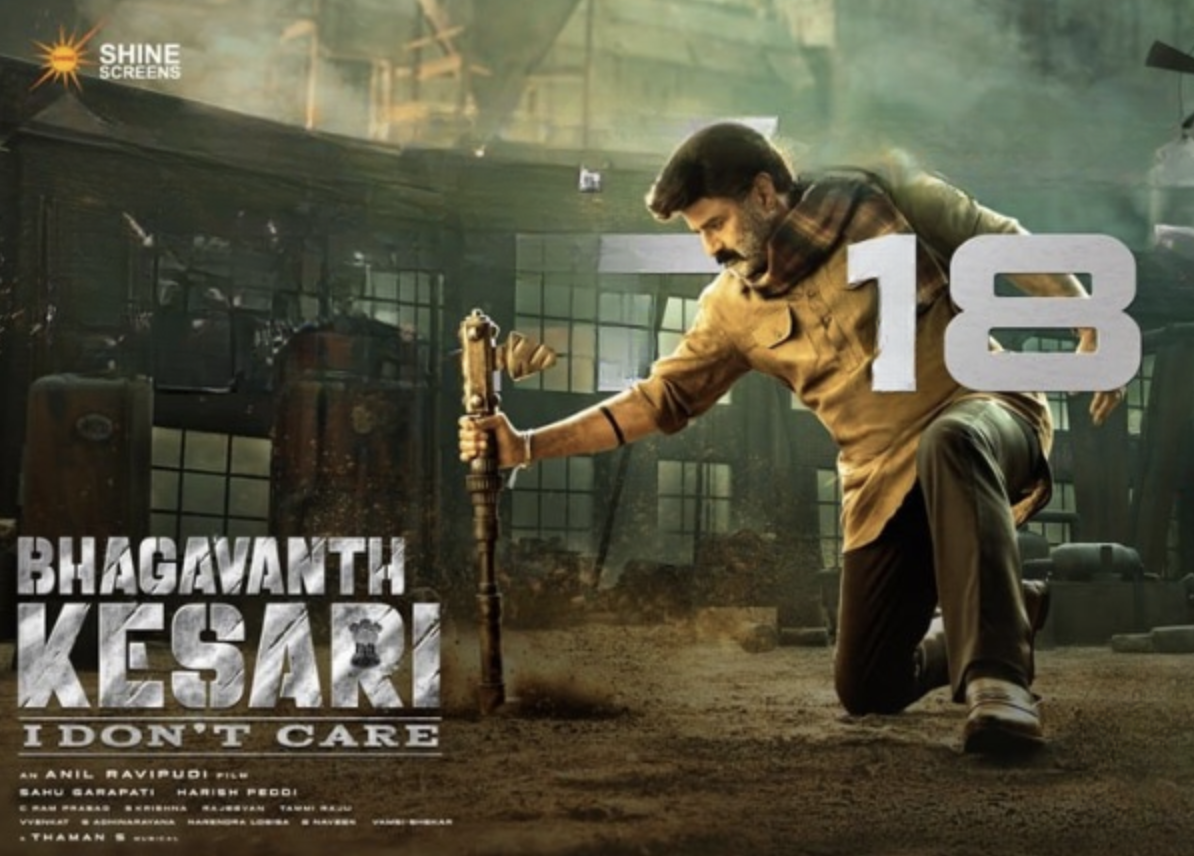2.75/5
Anil Ravipudi, who has one of the best success rates in TFI among young directors right now, has been associated with his fair share of tropes regarding comedy and staging from the start. He has his fans, and he has his haters. He has his hits, like Pataas and Raja the Great, but he also has his misses, like F2 and the recent F3. It’s a mixed bag when he enters his comfortable zone.
But Bhagavanth Kesari has always teased to be outside that zone. It has NBK in the title role, which is already a step up for Ravipudi being his first senior hero, but even for NBK it always promised a new attempt in the commercial genre. Sreeleela pairing as the daughter, a more age-appropriate look, and the constant promises from Ravipudi that story would be first despite having one of the biggest stars whose scripts always allude to the off-screen persona.
NBK also, who’s been going through a resurgence with Akhanda and Veera Simha Reddy, movies that aren’t good but are MILES better than 90% of his 2000s career, seemed to have been presented in a new light laden with his signature style, but with a few tweaks to keep it fresh. So expectations set and promises high.
Now does Bhagavanth Kesari achieve those promises? Yes and no. If you asked me after the first half, it would have been a resounding no. But the second half, as a dear Twitter troller mentioned, plate thippesindi. Anil Ravipudi does something that I perceived as largely impossible in the Telugu circuit; have a first half that gravely misses the mark, but a second half that hits in on the bullseye. Throughout the movie, Ravipudi makes it clear that there’s a story and arc forming, but its his execution that wavers inconsistently before crossing the finish line well. Ravipudi struggles, but he does cross that finish line to make Bhagavanth Kesari a winner in the end.
PLOT:
Bhagavanth Kesari (Nandamuri Balakrishna), a ex-convict, takes over the guardian duties of Vijji (Sreeleela), who’s father’s last wish was for her to join the army. In the process, he meets his love interest Kathyayini (Kajal) but also clashes heads with Rahul Sanghvi (Arjun Rampal), a powerful business tycoon. The Kesari-Vijji relationship and his conflict with Sanghvi makes up the rest of the story.

WRITING:
Ravipudi’s writing is inconsistent, with the highs shining but the lows really striking. The plot in itself, in its core form, is a plot that we have seen already in commercial cinema with tropes. What distinguishes it and sets it up with so much potential is the character of Bhagavanth Kesari itself. Ravipudi constructs his past and his present with equal amounts of suspense so that, while we revel in then journey of Bhagavanth Kesari as a character, it provides a more mature take at the classic tropes of good vs bad, facing up to higher officials, and rescuing and educating about feminism. Perhaps the smartest thing that Ravipudi does from a plot point is to take his time with the story so that, even though there are some lows, at the end the payoff is that deserved.
The writing of the story shines in bits and pieces. There are scenes that use subtlety, particularly in the initial portions, as well as scenes that need to stress on the emotion at hand. Bhagavanth Kesari is a character that has multiple shades of his life, and interspersing them through the screenplay instead of revealing them all at once was a smart decision. What’s more, is that the main track of Kesari-Vijji goes through a rollercoaster of itself. From being ignored just to elevate the main star even further, to taking a good center stage, the arc that transforms ends it on a good note. Ravipudi’s maturity can be seen through the school scene especially, where NBK makes a passionate appeal that has the setup that gives him the weightage to make that appeal, but never turns preachy.
Yet there is also flashes of the Ravipudi that sends people running from the theaters. The entire first half waddles in scenes that are exaggerated beyond belief or milked out for some emotion that shouldn’t even exist in the story. Tracks and tracks are written about Kajal and Balakrishna, going back and forth in a romantic relationship that neither looks good, nor achieves any goal. Commercially also, Ravipudi doesn’t commit to it and leaves it in the dust after 40 minutes, yet it is used for cheap gags that take away from the story throughout. That Ravipudi penchant of forgetting about crucial scenes remains throughout the first half, as it seems to choppy with side arcs and bits and pieces that don’t contribute to the story at any point. There are intelligent ideas, such as making a face-off between two old rivals (a trope that works so well), but never realized. Kajal’s character is also a waste of writing; it would have been much
Mainly, when talking about the writing, its a tale of two halves from the screenplay. The first half inconsistently wavers between forced comedy, a stock villain track, a romantic track that sets us back in our seats with cringe, and undeserved elevation after starting well. As said earlier, Ravipudi’s smartest decision is to reveal bits and pieces of Bhagavanth Kesari from his flashback rather than revealing it all at once, resulting in a more complete feeling to the arc. And the first half does start well from that aspect, as we get to know the angle that introduces Kesari and Vijji. The moment the movie shifts to present day is when the screenplay loses any semblance of coherency. Paired with terrible editing, it attempts to throw comedy, romance, stock villain moments, characters that don’t have any role, the writing is as dull as a broken pencil for the majority of this part.
Sample a scene where NBK is giving a warning to a police officer. The scene constructs that NBK, after rudely instructed to get the police officer tea, burn his officer and then heat the tea with that burning fire. Sounds good, right? But pair that with some crass over the top setups, interjected romance into the scene, and unneeded elevations zooming into the eyes and different body parts of Kesari, and you get a mincemeat of the scene at the end. Another scene is the Elevation forest fight, which actually is shot terrifically. But yet again, Ravipudi’s writing makes the decision to make Kesari himself narrate it to some stock characters, taking away from the impact of the scene itself. The ideas are all there; the characters are localized and reappear, and there’s a track to follow
Ravipudi’s writing decisions is what keeps following it to the interval, where it is composed well enough but still doesn’t promise much. The second half quite literally flips the entire script. The writing suddenly becomes 10x more sharper, with payoffs working tremendously and the action being written sharply and to the point. Flashback is interspersed terrifically with present day while Ravipudi balances the arcs on a tightrope arc. Scenes such as the school scene mentioned and what not suffer from its flaws, like convenience and standard TFI commercial exaggeration, but ultimately the maturity in his writing shows. The message never gets preachy, the action never gets overbearing, and it all leads to a crazy climax that quite literally explodes on screen with swag and mass.
Take the references for example. True to this word, there’s only one or two times that Ravipudi outrightly makes a reference to NBK outside the screen by taking a different track in the story; the rest happen in the moment and don’t hamper the scene as they are on paper, a great decision. This leads to it being funny and more impactful, rather than the diversion that other filmmakers have relied on to appeal to the fanbase. Let the character speak, and let the offscreen persona be subtle if it has to be there. Even the classic phrase gets a spin: “CocoCola Pepsi, Bhagavanth Babu Sexy”. Overall, Ravipudi’s writing is dual-shaded, but ends up being satisfactory.

DIRECTION:
Ravipudi’s direction is also decent for the most part. As said, the first half tends to not have any of the maturity and grip that the second half has, and a large form of that is the directing. Ravipudi’s direction sets out being quite monotone for most of the first half, attempting to establish a slow burn into the character of Kesari and Vijji amid in a predictable manner, but eventually ends up being way too exaggerated and hyperactive, with sequences turning over the top in the nature of itself. He doesn’t have much help from the technical crew except Thaman, but a few of the camera decisions are questionable, such as the random zoom ins and the performances that he extracts from individuals. His staging is also a bit underwhelming; localizing the story is a crucial part and is partially why the first half doesn’t work out, as the story feels all over the place at crucial junctures throughout the first half.
As a storyteller, Ravipudi does do his duty after the first half. It felt like his voice was getting so filtered as there was no clarity towards anything in the first half, and that as a director, he was simply playing to the galleries. Forced attempts at comedy and romance don’t help with the strong tale that he has, a predictable one of empowerment mixed with a masalafied class. But the second half is Ravipudi turning on his tonality to a good balance between subtle and high-octane while grippingly executing the payoff action sequences. The difference can be seen across the board; the forest massacre, no matter how well shot, is narrated amateurishly, but the confrontation with Sanghvi in present day for the first time has so much heft to it with sharp dialogues being spewed at. Dialogue-based comedy remains Ravipudi’s strength from a directorial standpoint; when he stages it and writes around it, it comes off as forced, but in the moment it sparks some laughs.
Ravipudi’s pacing is definitely a sour point. In crucial junctures, it goes way under the radar. As repeated many times, the first half empashizes certain portions over the other which results in no scene continuity from a editorial and direction standpoint. Some scenes go by extremely quickly without any emphasis while some are dragged out; there’s no clarity. Even in the second half, it feels like things are happening too quickly from a storytelling standpoint without having the space that the story needs to breath. When Ravipudi gives the movie space, he gives it at the wrong time, dragging it out. Staging is also a problem, seen by the entire credits scenes and the way its executed, but pacing is something that keeps poking at the movie.
It can’t be denied though that this is a good outing for Ravipudi, especially considering the way he turns the table in the second half. The action is gripping and follows a stream of events, the emotions hit the correct tonalities, and when there’s just comedy, it just builds on what was already shown in the second half. The side characters that annoyed initially become humorous because of the way they’re integrated and executed in the movie.
Ravipudi also has the mass scenes with a special type of energy that is just not seen too evidently in commercial cinema anymore. There isn’t any ulterior motive other than to appeal to the story, something I last saw in Waltair Veerayya where Chiru was appealed but there was also a strong commitment to the story at hand. He complements his writing so well in the second half, especially when it needs to get mass.
The climax needs to be talked about. On paper it is predictable but Ravipudi, the cinematographer, and the editor work hand in hand to create an enthralling last high that lasts so well on screen. Staging suddenly takes a turn for the better, and even so it becomes a celebration of the movie until that point; Bhagavanth Kesari at his best and the theme at its best. Leaves an imprint that stays with you long even after you leave the hall, even as I’m writing this review.
So look, Ravipudi did mess up, but comes back equally as strong. Does that constitute a bad film off the bat? Flaws considered, a very appreciable attempt by Ravipudi that sparkles. More than disappointment, you’re left with relief and hype that the movie just didn’t tank as it threatened too, but resurrected into a well made story.

PERFORMANCES:
This has to be NBK’s finest performance after his career resurrection. He’s fierce as ever in the commercial elements, and in the action scenes he puts in a power packed performance with his classic dialogue delivery. His mannerisms are a treat for fans, especially in the flashback. But what surprised me now especially was how subtle he was in the emotional scenes, especially in the first 5 minutes and towards the interval. The tough demeanor becomes soft, especially in the school scene, as NBK the actor shines through, something that I never thought I would say. Its so important he mouthes the feminist ideals too because, with his fan base and movies before endorsing toxic masculinity, the growth is remarkable. Playing his age definitely suits him, and I hope he continues it. Sreeleela’s career best role works out wonders, falling flat initially but being a true game changer in the second half. Her performance in the climax is very strong and in a pivotal scene, she does really well with her dialogue delivery. Kajal’s character is unneeded and performance over the top. Arjun Rampal is a stock villain, but fits the role; nothing good, nothing bad. Everyone else fades except for Delhi Ganesh who never fails to crack me up, and Sarathkumar has a maturity to his performance.

TECHNICALITIES:
Thaman, take a bow! He truly is a NBK fan with his rousing BGM throughout that varies in intensity subject to the story. The songs are ok, but the BGM is the main focus, and the title track is especially used to solid effect. Cinematography is decent except the strong zoom ins, with some frames, especially in the red light being lit really well. As I said before, all changes in the second half, and it applies here too. Editing especially; turns from some of the worst and choppiest editing I’ve seen in mainstream TFI to ruin the scene continuity to complement it decently. Production values are solid, dialogues are sharp and sometimes cringe, but regardless end up good.

SUMMARY:
It really did not feel like the same movie throughout, with an amateur directing the first half and a professional directing the second. Ravipudi, after flailing around, pulls the ship back spectacularly. A misfired emotional drama turns into a well made commercial treat. I was looking for reasons to not like the movie after the first half, but loved the second half to a level where this review became positive in the end. Positives are second half, first 15 of the first half, and negatives is the rest of the first half. Ultimately, it turns into the best NBK movie in a while. Give it a watch with your family.
